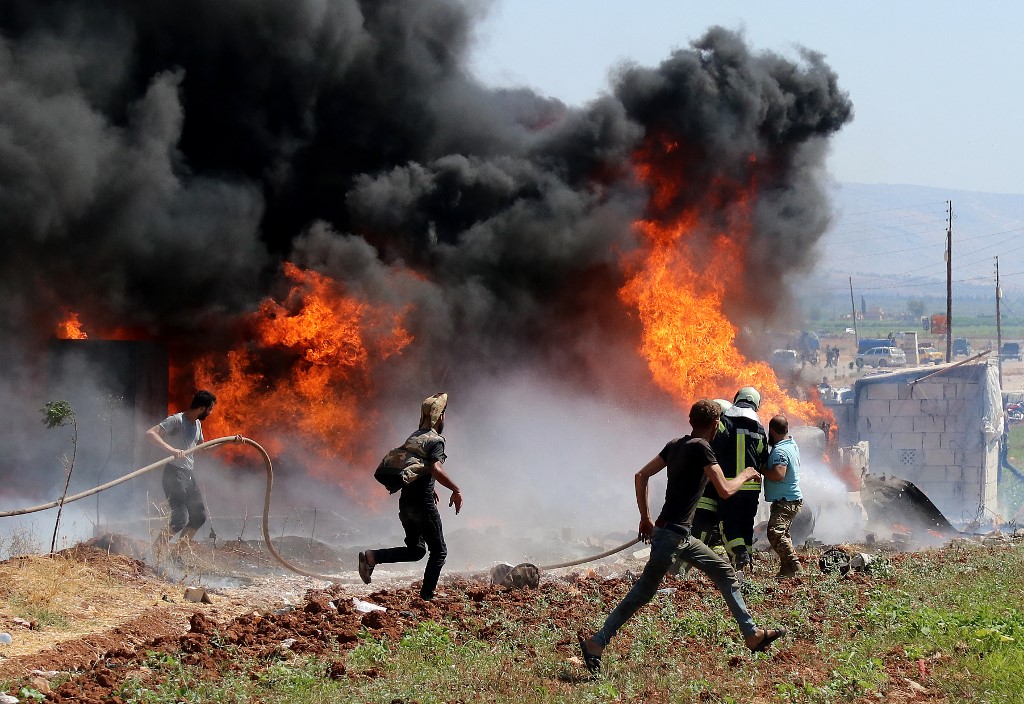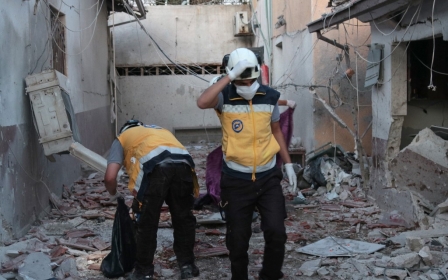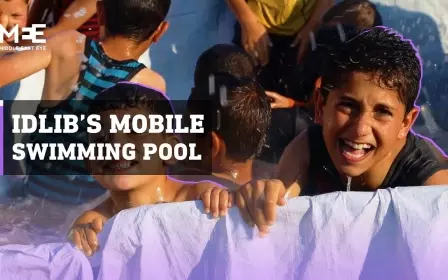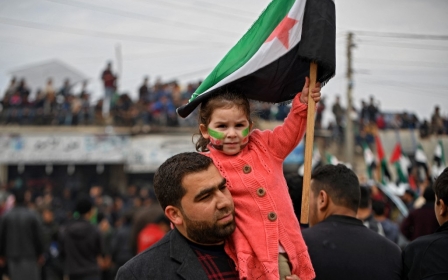Syria war: Shelling kills several children in southern Idlib
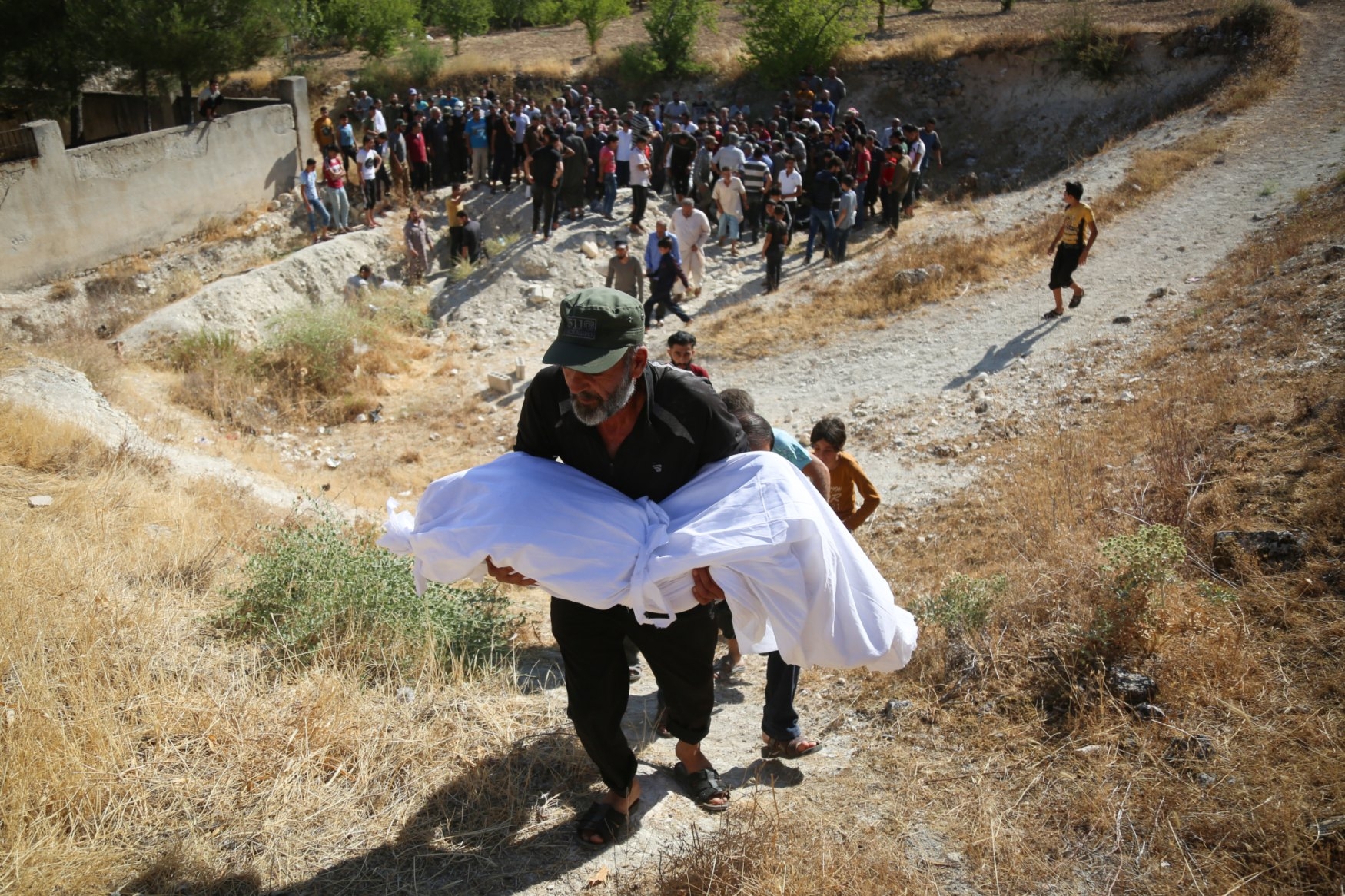
Five civilians were killed in an attack in rebel-held northwestern Syria early on Thursday morning, amid an escalation in hostilities threatening a 2020 ceasefire agreement sealed by Turkey and Russia.
The village of Balshun in the southern Idlib province area of Jabal al-Zawiya was hit by shelling around 6am, killing a mother and three of her children.
Another child from a different family died in the rubble of their family’s home.
'My cousin's house was targeted by a shell. We tried to search through the rubble but the house was hit by another shell'
- Yusuf al-Hajj Ajaj, relative of family killed in Balshun
The deadly attack comes a day after a missile attack killed three people, including a child, in the Turkish-held town of Afrin.
"My cousin's house was targeted by a shell. We tried to search through the rubble but the house was hit by another shell,” Yusuf al-Hajj Ajaj, a relative of the family of four who died in Balshun, told Middle East Eye.
“Their father was watering trees near the house during the attack. His eldest child was in the ninth grade and excelled in school,” Ajaj added.
The Syrian man said shelling was a frequent occurrence in the area, with families usually leaving their homes around dawn, fearing attacks.
"Normally, starting at 5am our families used to go out together to olive groves near the houses to avoid daily attacks," he added.
Jabal al-Zawiya has witnessed repeated attacks as forces loyal to Syrian President Bashar al-Assad and his Russian allies seek to pressure rebels to open the strategic M4 highway in southern Idlib to commercial traffic.
Turkey and Russia had agreed in 2020 to create a 12km-wide corridor on the highway, which connects Latakia to Aleppo, and carry out joint patrols.
Moscow suspended the joint patrols last August following several small-scale attacks by unknown groups and suspected militants against Turkish and Russian vehicles.
The Syrian government and its allied forces have also begun a new offensive in the northern Aleppo province.
Reopening the M4 highway would help revive the government's economy, mired by Western sanctions after more than 10 years of war.
‘Too afraid to leave the house’
The shelling of Balshun comes a day after the town of Afrin, held by pro-Turkish rebels, was hit by a missile attack, killing three civilians including a woman and a child.
“We were at home when we heard very loud explosions, and the screams of children and women began to rise in the neighbourhood,” eyewitness Rami, who requested to use a pseudonym, told MEE. “When we went out to the street, we found a small gas station burning. Near it, a man was burning inside his car.
'When we went out to the street, we found a small gas station burning. Near it, a man was burning inside his car'
- Rami, Afrin
“People fled towards the unknown for fear of a second attack. Within minutes all the shops were closed and the streets became deserted,” Rami added. “
With every bombing, the city experiences a black day, some people are displaced, and others remain too afraid to leave the house even to buy bread.”
Firas Khalifa, a spokesman for the civil defence group known as the White Helmets, told MEE that the victims could not be identified.
“The dead bodies were completely charred,” he said.
The Kurdish-majority civilian city of Afrin has faced similar attacks in recent weeks, injuring seven civilians.
Turkey-backed forces seized the area from Kurdish YPG forces in an offensive in 2018, causing widespread displacement of residents.
Some 16 civilians were killed in pro-government attacks in southern Idlib last month.
Civilians usually flee towards the Syrian-Turkish border, in hopes of safety but camps for internally displaced people (IDP) have become overcrowded, leaving many with little choice but to remain in southern Idlib.
The UN estimates that some 2.8 million IDPs live in northwestern Syria, 1.7 million of whom live in tents.
The number of displaced people from southern Idlib reached around 32,000 in July, according to OCHA, while some 43,000 were displaced in June, the largest number since the March 2020 ceasefire.
“There is no other place for civilians to go to. Many people are displaced at every attack, and others remain in their homes in the hope that the attacks will stop,” Khalifa said.
"Military operations launched by the regime forces have a wide impact on vulnerable groups in society, such as children.”
Middle East Eye propose une couverture et une analyse indépendantes et incomparables du Moyen-Orient, de l’Afrique du Nord et d’autres régions du monde. Pour en savoir plus sur la reprise de ce contenu et les frais qui s’appliquent, veuillez remplir ce formulaire [en anglais]. Pour en savoir plus sur MEE, cliquez ici [en anglais].


